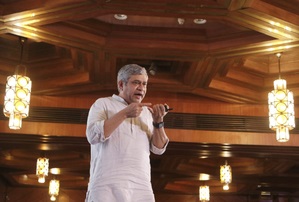Union Minister for Railways, Communications and Electronics & IT Ashwini Vaishnaw on Saturday summed up India’s growth journey in the last 10 years and explained what factors led to the expeditious growth, something that never happened in Congress-led United Progressive Alliance (UPA) eras.
Addressing the gathering at Viksit Bharat Ambassadors meet-up program in the capital, the Union Minister said that country has moved from ‘Fragile Five to Top Five Economies’ of the world and is now headed for another milestone.
He credited this to meticulous planning and focused execution, under the leadership of Prime Minister Narendra Modi.
“All this change didn’t happen automatically. A lot of effort, planning and execution has gone to bring this change. If this change was to happen on its own, it would have happened in 1970s and 1980s,” he said.
The Minister said that four pillars have primarily driven this growth, which include Public investment in social & physical sectors, Inclusive growth, Simplification of goals and Manufacturing push.
Elucidating the public investment and capacity building, he cited the example of his own ministry.
“Earlier, an average of 1050 kms of railway tracks were built in a year, that went to 5,300 kms of tracks in a year (equivalent to the size of Belgium, Austria and Switzerland),” Vaishnaw told the audience.
“During the first 60 years after Independence, railway electrification took place on 20,000 km track, in last ten years alone, over 40,000 km track was electrified,” he added.
He also enlightened the Viksit Bharat Ambassador participants about notable rise in number of topmost institutions including AIIMs, IITs, IIMs and also their capacity in nurturing talent over past few years.
Underlining government’s focus on inclusive growth, the Union Minister spoke on how ground-breaking initiatives like Swachchta Yojana and Jan Dhan accounts have brought a transformational change across the country.
Citing growth numbers, he said: “Over 10 crore free LPG connections were distributed under Ujjawala Yojana, 80 crore people are being provided with 5 kg foodgrains every month while 25 crore people have been lifted out of multi-dimensional poverty in past 10 years.”
Describing simplification as the third pillar of growth, he put forth examples of Telecom sector and Law department and said that lot of endeavor and planning went into bringing the paradigm change.
“India’s telecom sector was governed by an Act enacted in 1985. Today, that has changed. It took two years to conceptualise, brainstorm and enact the new Telecom law and today, that is giving us good direction and pace in new-age world,” he explained.
Similarly, over 1,500 laws have been repealed over a period of time, that didn’t happen overnight. It became possible because of meticulous planning and execution.
He further said that the change in mindset is one of the key reasons behind this paradigm shift.
“It’s because of our belief in indigenous production and faith in our own manpower that the country is scaling new heights of success,” he said while citing the example of the Chenab bridge, which is 100 feet higher than France’s Eiffel Tower.
He also said that Modi government has consistently focused on manufacturing and capacity building.
“In 2015 itself, the Prime Minister envisioned to make India into a global manufacturing hub. Make in India was a key component of this vision. Today, country is taking lead in in many similar areas including technology,” he said.
The Minister also heaped praise on Prime Minister for reviving country’s cultural consciousness and said that they form an important constituent of a strong nation.
“Taking pride in our own culture is something we realised in NDA tenures. Earlier, we were made to look down upon us but that must change, if we have to ride ladders of success,” he pointed out.




New Urban Community Health Centre to reduce patients rush in GBP Hospital: CM Dr Manik Saha
Chief Minister Dr Manik Saha on Thursday laid foundation stone of 50-bed Urban Community Health Center here at Agartala and said that the present government is working diligently to improve health infrastructure and services in the state.
Govt determined to develop sports infrastructure in Tripura: CM Dr Manik Saha
Chief Minister Dr Manik Saha on Thursday inaugurated football turf, athletics track and hockey ground here at Agartala Dasarath Deb Sports Complex at Badharghat and said that the government is determined to develop facilities and platform for sports persons in the state.
Mistake that benefits no one: World leaders react to Trump's 'reciprocal tariffs'
As US President Donald Trump signed an executive order on the so-called "reciprocal tariffs," the world reacted sharply against the decision, with some calling it a "mistake that benefits no one" while others called it a violation of Washington's obligations under the World Trade Organization (WTO).
Indian pharmaceutical exports get reprieve from Trump’s reciprocal tariffs
Because of the importance of India’s pharmaceuticals to US healthcare, those exports will get a reprieve from President Donald Trump’s reciprocal tariffs, according to the White House.
India stands less impacted by Trump tariffs than global peers: Industry
As US President Donald Trump announced reciprocal tariffs on dozens of countries, including India, industry experts said on Thursday that it appears India's export competitiveness to the US market stands far less impacted on a relative basis compared to global peers.
IAF pilot killed, another critical as Jaguar fighter jet crashes in Gujarat
An Indian Air Force (IAF) pilot lost his life, while another sustained critical injuries after their two-seater Jaguar fighter jet crashed near Gujarat's Jamnagar Airfield, the IAF confirmed on Thursday.
PM Modi emplanes for Thailand; to attend BIMSTEC summit
Prime Minister Narendra Modi on Thursday emplaned for Thailand on a state visit to attend the 6th BIMSTEC Summit, with his visit also set to bolster bilateral relations between New Delhi and Bangkok.
Bhavan’s Little Learners celebrate annual programme
The Bhavan’s Little Learners, Bordowali celebrated annual programme and organised prize distribution ceremony here at Agartala Rabindra Satabarshiki Bhavan on Wednesday.